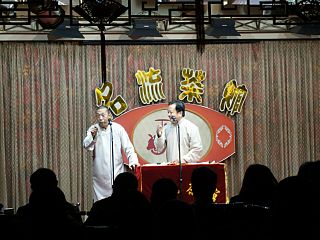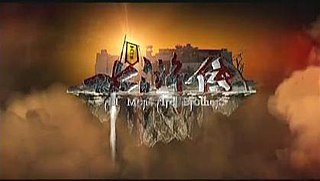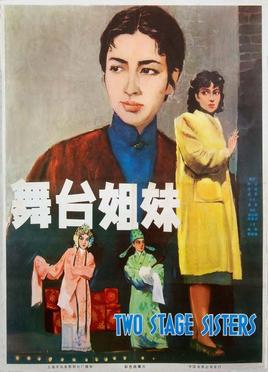
Traditional Chinese opera, or Xiqu, is a form of musical theatre in China with roots going back to the early periods in China. It is an amalgamation of various art forms that existed in ancient China, and evolved gradually over more than a thousand years, reaching its mature form in the 13th century, during the Song dynasty (960–1279). Early forms of Chinese theater are simple, but over time various art forms such as music, song and dance, martial arts, acrobatics, costume and make-up art, as well as literary art forms were incorporated to form traditional Chinese opera. Performers had to practice for many years to gain an understanding of the roles. Exaggerated features and colors made it easier for the audience to identify the roles portrayed.

Xiangsheng, also known as crosstalk or comic dialogue, is a traditional performing art in Chinese comedy, and one of the most popular elements in Chinese culture. It is typically performed as a dialogue between two performers, or rarely as a monologue by a solo performer, or even less frequently, as a group act by multiple performers. The Xiangsheng language, rich in puns and allusions, is delivered in a rapid, bantering style, typically in the Beijing dialect. The acts would sometimes include singing, Chinese rapping, and musical instruments.
The CCTV New Year's Gala, also known as the Spring Festival Gala, and commonly abbreviated in Chinese as Chunwan, is a Chinese New Year special produced by China Media Group (CMG). It is broadcast annually on the eve of Chinese New Year on its flagship CCTV-1 and internationally through the China Global Television Network The Gala has the largest audience of any entertainment show in the world, and is recognized by Guinness World Records as the world's most watched television program. The 2018 edition of the Gala attracted more than one billion viewers.
Iron & Silk is a 1990 Canadian action comedy-drama based on the eponymous book by American writer Mark Salzman. It details his journey to China after college to study Chinese wu shu, better known in the west as kung fu, and to teach English. Though not trained as an actor, Salzman starred as himself, as did Pan Qingfu, who claimed no one else could portray him on film. Salzman's experiences occurred in Changsha, Hunan, though the film was shot in Hangzhou, Zhejiang. The film was directed by Shirley Sun, and was the editorial debut for Geraldine Peroni.

Shek Wing-cheung, better known by his stage name Shih Kien, Sek Kin, or Sek Gin or Shek Kin(Chinese: 石堅; pinyin: Shí Jiān; Jyutping: Sek6 Gin1), was a Hong Kong–based Chinese actor. Shih is best known for playing antagonists and villains in several early Hong Kong wuxia and martial arts films that dated back to the black-and-white period, and is most familiar to Western audiences for his portrayal of the primary villain, Han, in the 1973 martial arts film Enter the Dragon, which starred Bruce Lee.
He Saifei is a Chinese actress of film and television, as well as a celebrated Yue opera performer of dan (female) roles. Internationally, she is best known for playing supporting roles in period films like Raise the Red Lantern (1991) and Temptress Moon (1996).

The Story of Han Dynasty is a Chinese television series based on the events in the Chu–Han Contention, an interregnum between the fall of the Qin dynasty and the founding of the Han dynasty in Chinese history. The series was first broadcast on CCTV in China in 2003. Directed by Wei Handao, the series starred Hu Jun, Xiao Rongsheng, Jacklyn Wu, Kristy Yang, Wang Gang and Li Li-chun.

All Men Are Brothers is a 2011 Chinese television series adapted from Shi Nai'an's 14th century novel Water Margin, one of the Four Great Classical Novels of Chinese literature. The series is directed by Kuk Kwok-leung and features cast members from mainland China, Taiwan and Hong Kong. The series was first broadcast on 8TV in March 2011 in Malaysia.

Two Stage Sisters is a 1964 Chinese drama film produced by Shanghai Tianma Film Studio and directed by Xie Jin, starring Xie Fang and Cao Yindi. Made just before the Cultural Revolution, it tells the story of two female Yue opera practitioners from the same troupe who end up taking very different paths in their lives: "one succumbs to bourgeois affluence and privilege, while the other finds inspiration and fulfilment in the social commitment associated with the May Fourth movement and the thought of Lu Xun.” The film documents their journey through abusive feudal conditions in the countryside before achieving success and prestige on the stage, meanwhile historically following Shanghai's experience under Japanese and KMT rule. This original screenplay depicts the socio-political changes encompassing China from 1935-1950 through the theatrical world of Shaoxing, and accordingly mixes both a Chinese aesthetic with Hollywood and socialist realist forms. The main protagonist is said to be based on the life of Xie Jin's friend and opera-veteran Yuan Xuefen.

Yue opera, also known as Shaoxing opera, is the second most popular Chinese opera genre. Only Peking opera is more popular nationwide.
The Legend of Crazy Monk is a Chinese television series about the life of Ji Gong. The series was directed by Lin Tianyi and based on Guo Xiaoting's classical novel Biography of Ji Gong. It was a hot TV series recently in Guangdong Television, Jiangsu Television and Shenzhen Television. It is shown on Mediacorp Channel 8 at 7pm.

Yu Kuizhi is a Peking opera performer of Hui Chinese ethnicity. He plays the role of elderly men (laosheng) in Peking Opera.
A Dream of Red Mansions is a Chinese serial feature film produced by Beijing Film Studio, released in 6 parts between 1988 and 1989. Directed by Xie Tieli (谢铁骊) and Zhao Yuan (赵元), it is a cinematic adaptation of the 18th-century Chinese novel of the same name. The film took two years to prepare and three years to shoot, and remains, at 735 minutes, the longest ever made in the People's Republic of China.
Zhongguo feng or Chinese style music is a popular Chinese music genre considered to adopt a more traditional musical style in its instrumental than normal popular music, similar to Chinese traditional music but with a "Modern Twist" style way. Following the success of Taiwanese singer Jay Chou's early works including "Wife" (娘子) and "East Wind Breaks" (東風破), it emerged in the popular music scene in early 2000s.

Sun Yueh was a Taiwanese actor.
Mao Weitao is a Chinese Yue opera actress-singer who usually portrays Sheng roles. A founding member of the acclaimed Zhejiang Xiaobaihua Yue Opera Troupe who also served as its president from 1999 to 2018, Mao Weitao is a household name among Yue opera listeners. For non-opera listeners, she is best known for her portrayal of Dongfang Bubai in the 2001 TV series Laughing in the Wind.
Birthday Celebration by Five Daughters (五女拜壽) is a Chinese Yue opera play written by Gu Xidong (顾锡东) in 1982, set in the Ming dynasty before and after the fall of Yan Song. There is some similarity between the story and that of King Lear, although Gu Xidong never acknowledged any Shakespearean influence. The story emphasizes the importance of traditional Confucian values such as filial piety, which like traditional theatre had been attacked and suppressed during the Cultural Revolution (1966–1976).
Bo-Ying Lee (Chinese: 李寶瑩 is a former Chinese actress and Cantonese opera singer from Hong Kong. Lee is credited with over 45 films.
Ho-Kau Chan was a Hong Kong actress and Cantonese opera singer. She was credited with over 130 films.









